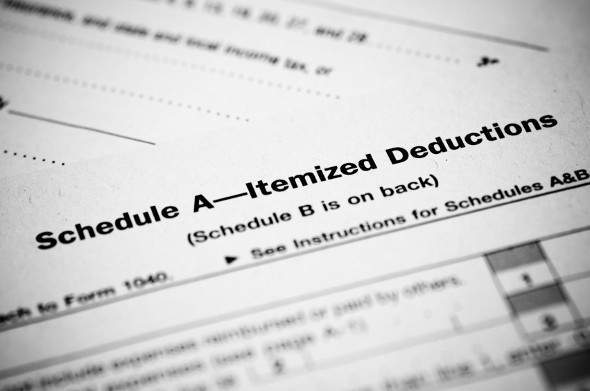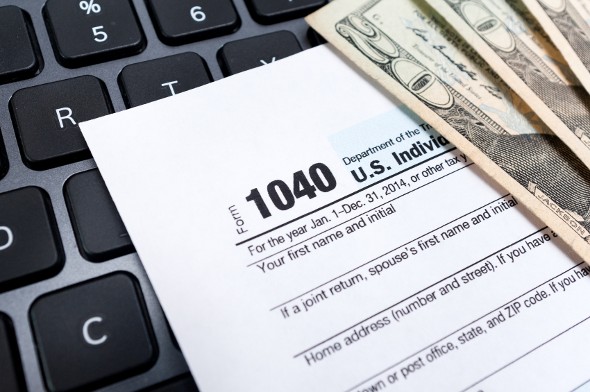The mortgage interest deduction lets you subtract the interest you pay on your mortgage from your taxable income. If you bought your home after December 15, 2017, you can deduct interest on up to $750,000 of mortgage debt. If you bought earlier, the limit is $1 million. To claim this, you must itemize deductions, but it can lower your tax bill if your mortgage is near the limit.
A financial advisor can help you decide if itemizing for the mortgage interest deduction gives you a bigger tax benefit than taking the standard deduction.
How the Mortgage Interest Deduction Works
The mortgage interest deduction was designed to encourage homeownership. While it’s up for debate whether it does so, it does take the sting out of your mortgage payments. Just as landlords can deduct mortgage interest on rental properties they own, anyone who owns property can deduct home mortgage interest from their taxable income, lowering their potential tax bill.
Homeowners who itemize their deductions can deduct their mortgage interest on up to $750,000 of debt from a home purchase (or up to $1 million if you incurred the debt on December 15, 2017 or earlier). The home can be a second residence as long as you don’t rent it out, or if you do, you rent it out for only part of the time. You can also claim the deduction for both a primary and second home, up to the cap.
In addition to home mortgage interest, taxpayers can deduct late payment charges, mortgage prepayment penalties and a percentage of any points paid when getting the mortgage. Previously, you could include the interest paid for home equity loans of up to $100,000, regardless of how you spent the borrowed money. Now, you can do so only if you used the money to buy, build or substantially improve your home.
Why the Mortgage Interest Deduction May Not Help
For 2025, the standard deduction is $15,750 for single filers and $31,500 for married couples filing jointly. These amounts mark a further increase from the bump they previously received under the Tax Cuts and Job Act as part of Trump’s latest tax legislation, the “One Big Beautiful Bill” (OBBB) enacted in July 2025.
Because of these increases in the standard deduction, itemizing deductions (including mortgage interest) is often unnecessary. For many people, claiming the standard deduction is far more advantageous, tax-wise.
Indeed, it really only pays to claim the mortgage interest deduction if you have a really big mortgage or two mortgages (because you have a second home). In other words, the deduction is a gift to the wealthy in most situations. However, savvy investors might be able to take advantage of this deduction.
What the Critics Say
This has always been part of the criticism of the mortgage interest deduction, but it is even more so, since the TCJA became law and the OBBB further increased the standard deduction. The stated goal of the mortgage interest deduction is to increase homeownership among middle-income Americans. Yet research shows (even before TCJA) that most of the benefits of the mortgage interest deduction go to wealthy families.
This is partly because any itemized tax deduction favors the rich. Unlike a tax credit, a tax deduction is more advantageous the higher up the income ladder you go. If your top tax rate is 37%, a $1,000 reduction in your taxable income is more valuable to you than to someone whose tax rate is 12%. Plus wealthier people generally buy more expensive homes and are more likely to have a second home. So the amount they deduct is typically far greater than what middle-class homeowners typically claim.
This brings us to another point of criticism: The deduction doesn’t encourage responsible, affordable homeownership among the middle class. If anything, it encourages middle- and working-class families to go for “reach” houses and take out bigger mortgages. The financial crisis of 2008 showed us why that can be dangerous.
What Can Be Deducted for Mortgage Interest

If you’re going to use the mortgage interest deduction, then it’s important to understand what qualifies as mortgage interest and what the rules are. The IRS details the qualifications in Publication 936. Per these rules, you can deduct the following as mortgage interest:
- Interest on a mortgage for your main home: The home itself must be collateral for the mortgage, meaning the mortgage is a secured loan, to deduct your mortgage interest. Beyond that, it does not matter what type of home you have the loan on. You can even claim the deduction if you get a nontaxable housing allowance from the military or if you receive a mortgage in order to complete a buy-out during a divorce.
- Interest on a mortgage for your second home: You can deduct interest from as many homes as you would like, as long as you own them and have a mortgage. You don’t have to use the house at all to claim the deduction, but the second home rules apply if you rent it out.
- Late payments: You can deduct late mortgage payment penalties.
- Prepayment penalties: If you get charged a fee for paying off your mortgage early, these fees can be deducted.
- Home equity loan interest: If you take out a home equity loan to buy, build or substantially improve your home, then you can deduct the interest on that loan.
- Mortgage points: If you prepaid interest on the mortgage of your main home in the form of points, you can deduct those points.
What Is Not Deductible as Mortgage Interest
There are a few items that are not deductible as part of the mortgage interest deduction. These items aren’t directly related to the mortgage itself and are actually additional costs to consider when purchasing a home.
Items that don’t qualify include:
- Settlement costs
- Forfeited deposits or earnest money
- Extra principal payments made on the mortgage
- Title insurance
- Homeowners insurance
- Interest accrued on a reverse mortgage
State and Local Differences in Mortgage Interest Deductions
The mortgage interest deduction is most often discussed at the federal level, but state and local tax rules can also affect how much this deduction helps you. Some states follow federal guidelines and allow you to deduct mortgage interest on your state income tax return. Others place stricter limits on deductions or do not allow them at all. And in states with no income tax, there is no state-level mortgage interest deduction available.
For homeowners in states with high property values, the ability to claim mortgage interest at both the federal and state level can make itemizing more attractive. For example, a homeowner with a large mortgage in California or New York may benefit more from the combined deductions than a homeowner in a state without a comparable rule. On the other hand, in places where mortgage interest deductions are not permitted, the federal deduction may be the only tax savings available.
These differences mean that the true value of the mortgage interest deduction depends not only on federal law but also on where you live. Before deciding whether to itemize, it’s important to review both your federal and state returns to see how the rules interact. Looking at the combined impact can help you get a clearer sense of whether itemizing for mortgage interest actually lowers your overall tax bill.
Bottom Line

The bigger your mortgage and the higher your income, the more valuable the mortgage interest tax deduction will be to you. That’s not to say that you should buy the most lavish house you can finance though. It’s important to learn from the past and most likely stick to the comfortable affordability limit when you’re making the jump to homeownership. Still, in some situations, the mortgage interest deduction can offer valuable savings.
Tips for Buying a Home
- Both buying a home and figuring out your taxes and potential deductions can be very difficult and time-consuming. You might benefit from having a financial advisor answer your questions on both. Finding a financial advisor doesn’t have to be hard. SmartAsset’s free tool matches you with vetted financial advisors who serve your area, and you can have a free introductory call with your advisor matches to decide which one you feel is right for you. If you’re ready to find an advisor who can help you achieve your financial goals, get started now.
- Make sure your credit score is in good shape. With a high credit score, you can get lower mortgage rates, which translates to lower monthly mortgage payments.
Photo credit: ©iStock/GetUpStudio, ©iStock/Catherine Lane, ©iStock/emmgunn
